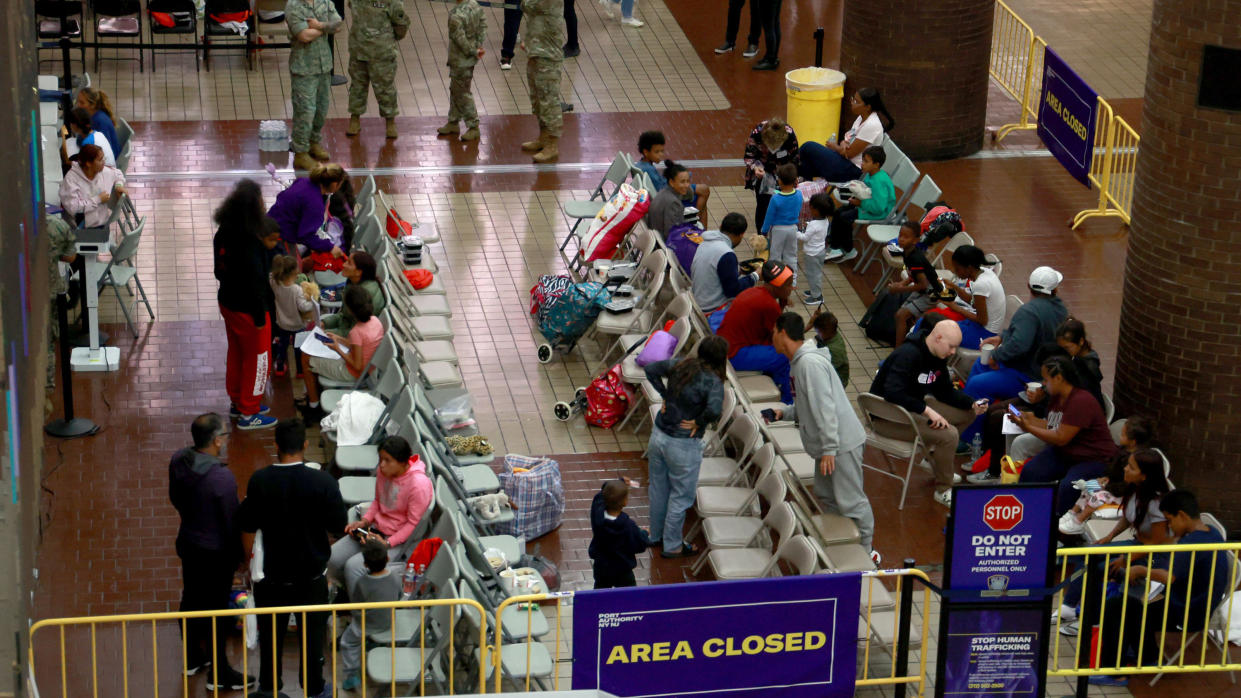NYC officials ‘definitely’ considering curfews at migrant shelters amid panhandling complaints

- Oops!Something went wrong.Please try again later.
- Oops!Something went wrong.Please try again later.
The Adams administration is “definitely” considering instituting curfews at all migrant shelters in the city amid complaints about residents at some of them venturing into nearby neighborhoods at night to beg for money, the Daily News has learned.
Molly Schaeffer, director of Mayor Eric Adams’ Office of Asylum Seeker Operations, revealed the curfew considerations during a closed-door migrant crisis briefing with local lawmakers Thursday. She did so after Queens Councilwoman Joann Ariola, a Republican, asked why the so-called HERRC shelters, which only house migrants, aren’t subject to curfews when traditional Department of Homeless Services shelters typically are.
“We’re definitely looking into a curfew across the system, we’ll get back to folks on that,” Schaeffer said of the HERRC system during the closed-door meeting.
In a reference to the fact that many migrants in the city work nighttime jobs, such as food delivery gigs, Schaeffer continued: “We obviously want to make sure that people have the ability to work, and that it’s worth giving as many opportunity for people to work as possible, but we’re looking into it across the system.”
Ariola told Schaeffer a curfew is a good idea because “we’re beginning to see more and more migrants entering adjacent communities, and begging at front doors and such at all hours of the day and night.”
“So a curfew would be helpful for the adjacent neighboring homeowners,” Ariola added.
After the briefing, Ariola, whose Howard Beach-based district isn’t home to any HERRCs, said in a text message that migrants living at the sprawling emergency shelter at Floyd Bennett Field have started going to the Rockaways to ask local residents for money, food and clothes. The news outlet The City recently reported a similar trend is playing out in southern Brooklyn’s Marine Park, a reliably Republican neighborhood where some anti-migrant sentiment has taken root, resulting in hostilities.
Spokespeople for the mayor did not immediately return requests for comment on details about a potential HERRC curfew, including what the cutoff time for access would be.
Residents of Department of Homeless Services shelters generally have 11 p.m. curfews.
“These [HERRC] sites should have the exact same curfews as the ones currently in place at our DHS shelters, unless a reasonable accommodation is granted,” Ariola said.
New York Immigration Coalition Executive Director Murad Awawdeh, whose group has helped welcome migrants to the city since 2022, said the Adams administration is focusing on the wrong issue in pushing for HERRC curfews in response to complaints about migrant begging.
“We should be looking into why they are not getting the help that they need at the centers, considering that the city has been saying they’ve been all along providing migrants with all the help they need,” Awawdeh said. “The knee-jerk reaction should not be more punitive measures or try to put people in a jam if they are a few minutes late. It puts more burdens on people as they’re trying to build up their lives.”
The administration’s weighing of curfew orders come as some 69,000 migrants continue to be housed in city shelters.
More migrants continue to arrive every day, with 3,400 entering into city shelters just last week, Schaeffer said in the briefing.
However, she said 2,800 migrants also left city shelters last week. The high exit rate is in part due to controversial policies enacted by the Adams administration that limit consecutive shelter stays to 30 days for single adult migrants and 60 days for migrant families with children. Migrants must reapply for shelter if they still need it.
City Councilwoman Gale Brewer, a Democrat who represents the Upper West Side, told Schaeffer and other administration officials on the briefing that she remains sharply opposed to putting migrant families on 60-day clocks, arguing the policy can be highly disruptive for kids.
“I think it’s terrible,” Brewer told them.

